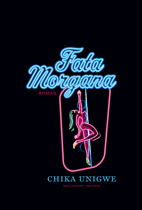Chika Unigwe
Fata Morgana
Disconcerting account of personal tragedy
The four African women in Fata Morgana, who work as prostitutes in Antwerp, are not entirely dissatisfied with their lot. But when Sisi is murdered in one of the suburbs, the other three come together seeking protection, bringing with them their horror and their questions.
Sisi had earned a diploma in Lagos, but she could not find a job and in desperation took up an offer from Dele to be smuggled to Europe. She, and the others, had had to pay substantial sums to sex trafficker Dele. Efe was sexually abused by a rich man when she was a child, then rejected by him when she became pregnant. Ama comes from a wealthy, strictly religious family; her father revealed he was really her stepfather, thinking this gave him the right to use her for sex. Joyce from Sudan was raped by soldiers. A man from an asylum centre, who has become Joyce’s friend and lover, pays off her debt to Dele. The women’s lives are shaped largely by poverty, lack of opportunity, sexual abuse and incest, corruption and injustice.
Dreaming of a future in which they will be free to lead normal lives, whether in the West or back in Nigeria, they are prepared to put up with discomfort for the time being. They have known worse. But they never find out that Sisi was murdered for trying to leave prostitution and therefore have no idea of the extent to which they are all Dele’s prisoners. The reader learns things that the characters themselves cannot know, even glimpses of the women’s future lives, thus further magnifying the tragedy of their illusions.
In her acknowledgements Chika Unigwe refers to ‘the anonymous Nigerian sex workers who allowed me into their lives, answered my questions and laughed at my ignorance.’ Thoroughly documented and starkly realistic, Fata Morgana is a disconcerting account of personal tragedy in a world still largely hidden from Western eyes, reinforced by Chika Unigwe’s intense personal commitment to their story.
Publisher
Meulenhoff | Manteau
Mechelsesteenweg 203
B-2018 Antwerpen
TEL. +32 3 285 72 00
FAX +32 3 285 72 99
E-mail: [email protected]
Website: www.standaarduitgeverij.be/meulenhoffmanteau
Publishing details
Fata Morgana (2007, 320 pp)

Biography
Chika Unigwe (b. 1974) is a Nigerian writer who lives in Belgium and who writes in English and Dutch. With her stories written in English she won the BBC Short Story Award in 2003, the Commonwealth Short Story Award in 2004, and was nominated for the Caine Prize, the African Booker Prize. She made her debut as a novelist in 2005 with De feniks (The Phoenix), about the personal problems of an African woman in Flanders. In the novel Fata Morgana (2007) sex trafficking from Nigeria is portrayed through the world of black prostitutes in Antwerp. It has been translated into English, Italian, German, and Hungarian. In her latest novel Nachtdanser (Night Dancer), which is set in Africa, Chika Unigwe returns to Enugu, the city of her birth in the southern part of Nigeria.
Quotes
An eventful yet soberly chronicled account of four African women desperately trying to escape their wretched circumstances.
Trouw
Vivid, gripping prose.
NRC Handelsblad
